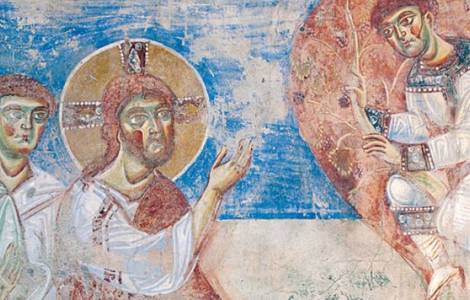
Vatican City (Agenzia Fides) - "God does not pass by without looking for those who are lost", Pope Francis writes in the text of the catechesis prepared for today's general audience and released only in written form. The Pontiff, continuing the cycle of catecheses dedicated to the life of Jesus read in the light of the themes of the Holy Year that the Church is experiencing, today focuses on the encounter that Christ had with Zacchaeus, "an episode that is particularly close to my heart, because it has a special place in my spiritual journey", reveals the Bishop of Rome in the text.
The encounter takes place in the city of Jericho, "located below sea level" and for this reason "considered to be an image of the underworld, where Jesus wants to go in search of those who feel they are lost. And in reality, the Risen Lord continues to descend into today’s underworlds, in places of war, in the suffering of the innocent, in the heart of mothers who see their children die, in the hunger of the poor".
The evangelist Luke describes Zacchaeus as merciless: "not only is he a publican, a person who collects taxes from his fellow citizens for the Roman invaders, but he is the chief of publicans, no less, as if to say that his sin is multiplied". Not only that. The author of the sacred text, the Pope emphasizes, points out "that Zacchaeus is rich, suggesting that he has grown rich on the backs of others, abusing his position".
But "when he comes to know that Jesus is passing through the city, Zacchaeus feels the desire to see Him". For him, the Pontiff emphasizes, "it would be enough to watch him from a distance" but his desire must deal with reality: he is short and the crowd prevents him from seeing Jesus. So, "just like a child", he climbs a tree "in order to watch without being seen, hiding behind the branches".
"But with the Lord, the unexpected always happens. Jesus, when He comes close, raises His eyes. Zacchaeus feels he has been discovered, and probably expects a public rebuke. The people may have hoped for it, but they are disappointed: Jesus asks Zacchaeus to come down immediately, almost surprised to see him in the tree, and says to him: “Today I must stay at your house!”.
In this passage, the Pope points out, the evangelist "highlights the joy in Zacchaeus’ heart", "the joy of one who feels that he has been seen, acknowledged, and above all forgiven. Jesus’ gaze is not one of reproach, but of mercy. It is that mercy we sometimes struggle to accept, especially when God forgives those who, in our opinion, do not deserve it. We grumble because we would like to impose limits on God’s love".
And in Zacchaeus' house, "after listening to Jesus’ words of forgiveness, stands up, as if he were arising from a condition of death. And he gets up to make a commitment: to return four times what he has stolen. It is not a price to be paid, because God’s forgiveness is free, but rather the desire to imitate the One by whom he felt loved. Zacchaeus makes a commitment to which he was not bound, but he does so because he understands that this is his way of loving. And he does so by combining the Roman legislation regarding theft and the Rabbinic law on penance. His purpose is not generic or abstract, but stems precisely from his history: he looked at his life and identified the point from which to begin his transformation", concludes the text of the pontifical catechesis. (F.B.) (Agenzia Fides, 2/4/2025)
